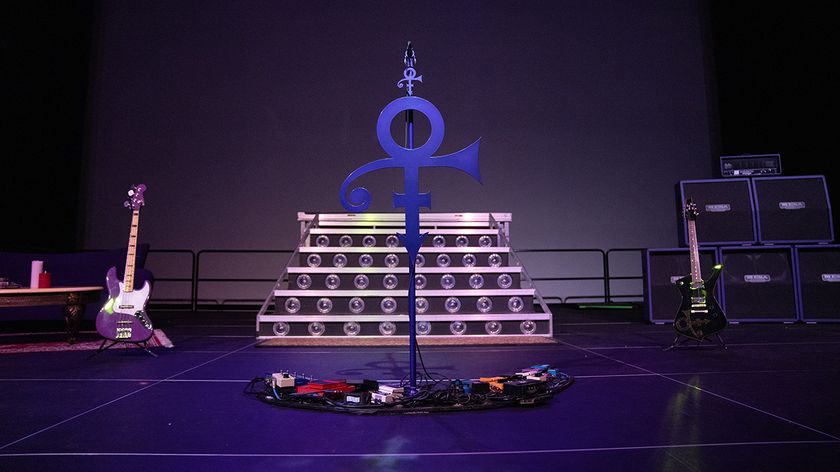Best external hard drives for music production 2025: Back up your music and boost your computer's performance
Store recording sessions, video files, and sample libraries with our expert pick of the best external hard drives for Mac and PC
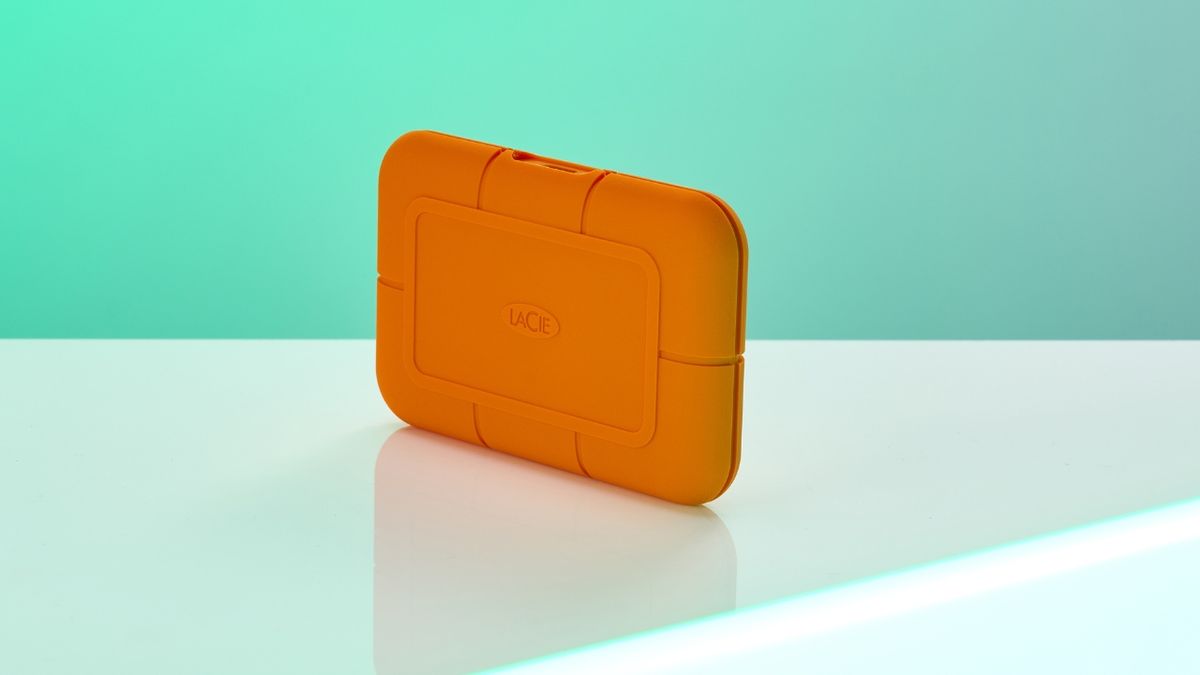
It might not be the most exciting thing you'll buy for your home studio, but there's no doubt that one of the best external hard drives is an essential purchase for any music maker. Whether you're laptop-based working on the go or you need more storage for your permanent studio space, these options will have you covered.
There are two types of hard drives in this world, those that have failed, and those that haven't failed yet. If you care at all for the music you make, then you should have an additional hard drive with all your hard work backed up on it as a minimum. The feeling of losing years' worth of work is not a good one, trust us, we've been there.
External hard drives are not just for backing up data though. If you're a Mac user, then you'll be well aware that while brilliant for audio they're not upgradeable, so you're going to quickly run out of space the more music you make. An external hard drive becomes an essential bit of kit pretty quickly in the modern age, and it has the side benefit of improving the performance of your machine by freeing up space and resources.
In this guide, we've listed our favourite hard drives by use case, so you can get a great overview of what's best suited to your particular needs. We've got options to cover musicians on the go, those in permanent studios, and even an encrypted option for the security conscious. If you want to know more before you buy, you can check out our how to choose and FAQs section for loads of useful info.
Product guide
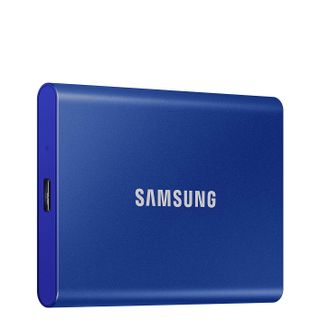
Type: SSD
Capacity: 1TB - 4TB
Interface: USB 3.0
+ Slimline
+ Reliable
+ Choice of colours
- Metal chassis can scratch
For us, the best external hard drive for musicians right now is the Samsung T7. We used a trusty Samsung T5, this version’s predecessor, for around 4 years without a single problem, so recommending this new version is easy.
We loved the rapid transfer speeds, the fact it’s so small and can therefore be carried in your jeans’ pocket, and the choice of different colours on offer. With it being an SSD, and therefore able to be bus powered - meaning it doesn’t require an additional power source - it is ideal for a variety of use cases, including iPads, laptops and cameras.
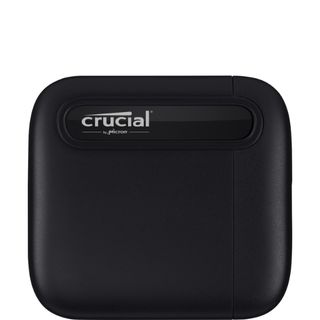
Type: SSD
Capacity: 500GB-4TB
Interface: USB 3.2
+ Great value
+ Compact
+ USB-C connector
- Not the most rugged
The Crucial X6 offers 1TB for around the £/$60 mark, making it a great choice if you're looking for an external hard drive on a budget. It's also available in bigger sizes which get progressively more expensive but even at 2TB you'll still be around $/£100, giving you a lot of bang for relatively little buck.
We found its performance not to be the fastest, but certainly enough for the majority of music-makers when backing up project files or loading samples. It's absolutely tiny too, so will easily fit in a pocket and is lightweight enough to carry around with you. It features a USB-C connection making for easy interfacing with modern laptops and computers.
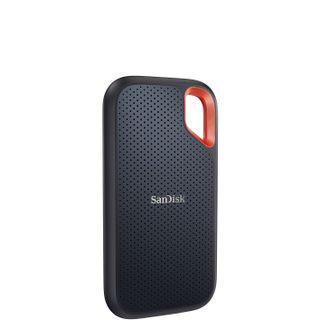
Drive type: SSD
Capacity: 250GB-2TB
Interface: USB 3.1 Gen2
+ Respected brand
+ Protection
+ Carry hook is useful
- Some may need more capacity
Taking rugged portability to the next level comes the SanDisk Extreme Portable. With the high data transfer speeds you'd expect of an SSD, the Extreme Portable also packs in a bunch of resistance to things like dust, water, and drops.
You might think this could be a bit overkill for creative production tasks. But consider the field recordist stood out in the rain capturing the sounds of nature, or the videographer filming in harsher climes. If reliability and toughness are required, the SanDisk Extreme might be your new best buddy.
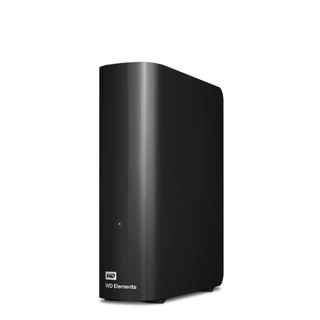
Drive type: HDD
Capacity: 4TB-25TB
Interface: USB 3.0
+ Good value
+ Plenty of capacity
+ Great for studios
- Not ideal for streaming
As one of the other big names in media storage, Western Digital – now more commonly known as WD – has a wide range of options for your data needs. The WD Elements Desktop range is great for those musicians who need a lot of storage for a more permanent
The Elements range comes in sizes up to 25TB – enough to store a huge amount of project files. Data transfer is handled by USB 3.0, which lags behind modern USB C options, but as a backup drive, it will more than suffice for keeping your back catalogue safe.
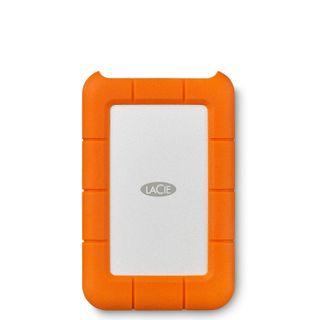
Drive type: SSD
Capacity: 1TB-4TB
Interface: USB 3.0
+ Rugged build quality
+ Bright colours
+ Decent transfer speed
- Looks will put some off
Certain drives become synonymous with certain applications, and the LaCie range's popularity with creative professions is legendary. These iconic orange drives are used by photographers, videographers, and musicians everywhere, and for good reason.
On paper, the LaCie Rugged Mini drives aren't that advanced. They only offer a 5,400rpm data transfer speed, so realistically you aren't going to be streaming sample libraries from one. But as a portable backup drive, its shock resistance and small size mean it is perfect for on-the-go performers and creators.
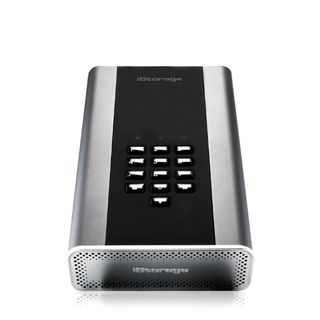
Drive type: HDD
Capacity: 1TB-24TB
Interface: USB 3.2
+ Ultra secure
+ Ruggedly built
+ Plenty of size options
- Not an SSD
If you need to keep prying eyes away from your precious stems or project files, the iStorage DiskAshur DT2 is a high-security, encrypted external hard drive that will keep your data safe. With a great selection of built-in security features, it also has a pin code entry on the exterior for extra safety.
This is a chunky bit of kit, definitely not one for carrying around in your pocket although it'll be fine in a backpack. It feels really well built though, which is extra reassurance if security is your top concern. It also features AES-XTS 256-bit full-disk encryption, which is military-grade encryption.
How to choose
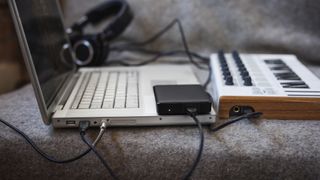
How to choose the best external hard drive for you
MusicRadar's got your back
When it comes to seeking out an external hard drive for your music studio, musicians and producers need to consider several crucial factors to ensure they make the right choice.
First and foremost, speed matters. As we know, music production often involves handling large files, from raw audio recordings to high-quality samples and virtual instruments. A hard drive with fast data transfer speeds is essential for smooth workflow and seamless playback. Look for drives with USB 3.0 or higher, as they offer faster transfer rates, reducing the time spent waiting for files to load or transfer.
Storage capacity is another critical consideration. As your music library grows and you accumulate more project files, you'll need ample space to store everything. Determine your storage needs based on the size of your projects and the volume of files you work with regularly. It's often wise to invest in a drive with more capacity than you currently need to accommodate future growth.
Recording on the go
Musicians and producers who are constantly on the move will value durability, and portability, from an external hard drive. Whether you're travelling to gigs or working in different studio environments, your hard drive needs to withstand the rigours of life on the road. Look for drives with sturdy enclosures and shock-resistant features to protect your data from accidental bumps and drops. Likewise, a compact, lightweight drive that fits easily into a laptop bag or backpack is ideal for on-the-go creativity. Consider factors like size, weight, and connectivity options to ensure your drive is convenient to carry and use in various settings.
Above all, prioritise reliability
Reliability is perhaps the most critical factor of all. As a musician or producer, your hard drive is the lifeline of your creative work, storing years of music projects, samples, and recordings. Choose a drive from a reputable manufacturer known for producing reliable, high-quality products. Read user reviews and resources like this guide. Seek recommendations from fellow musicians to ensure you're investing in a drive that will stand the test of time.
So, when you’re choosing an external hard drive for your music studio, prioritize factors like speed, storage capacity, durability, portability, and reliability. By considering these key factors and choosing a drive that meets your specific needs, you can ensure smooth workflow, secure data storage, and uninterrupted creativity for years to come.
FAQs
What type of external hard drive is best?
In all honesty, we'd always advise you to go for an SSD. The performance upgrade versus the older style HDD is so much that you'll get massively quicker transfer speeds and performance. This is particularly useful if you're storing virtual instrument libraries and samples on your external drive, as you'll be able to load them into your DAW much more quickly.
Are external hard drives still worth it?
For laptop based music-makers an external hard drive is an essential purchase. If you're in the Mac ecosystem, whether desktop or laptop, the inability to upgrade your internal storage means at some point you'll need to purchase one to increase your capacity.
With the advent of SSD and M2 powered drives alongside the fast transfer speeds of USB-C, external drives are now just as high performing as internal hard drives. They also come with a whole host of benefits for musicians, particularly when it comes to portability, as they allow you to take your music collection anywhere you go.
On a more general note, backing up your music is just generally good practice, and having your backups on an external drive makes them more accessible than an internal hard drive for a PC.
What is the downside of an external hard drive?
The one major downfall of an external hard drive versus an internal one is that it's more susceptible to damage. Whether that comes from dropping it or losing it, an external hard drive by definition is more exposed, and the compact ones are more easily misplaced.
How do I transfer from my computer to an external hard drive?
Nowadays it's really quite simply to do this. Simply plug your external hard drive into the appropriate connection on your computer. If you're on a Mac it will appear on the desktop, whereas for Windows users you'll likely get a pop up asking what you want to do with it, or you might have to navigate to 'My Computer' to see your drive.
Once you've done this, head over to your files and simply drag and drop them to the external hard drive. You'll be greeted with another pop up and after some time your files will have moved. If you're regularly making music it's definitely worth getting an additional drive to act as a back up and depending how regularly you're diving into folders, backing up on a weekly or monthly basis.
How we choose
At MusicRadar, our team comprises seasoned players and experts immersed in the world of music making, from drummers and guitar players, to producers and DJs. With years of playing and meticulous product testing, we bring a wealth of knowledge to the realm of music gear. We live and breathe everything related to music making, including the peripherals that make our workflows more streamlined and efficient.
When it comes to identifying the best external hard drives for music currently available, we employ a rigorous selection process. Our approach involves a fusion of hands-on experience, user reviews, and in-depth discussions with our editorial team to ensure a well-rounded evaluation of the top products in this distinctive category.
As dedicated music makers ourselves, our primary goal is to assist fellow musicians in discovering the perfect gear for their sound or workflow. We meticulously consider factors ranging from budget constraints to the intricacies of feature sets, ease of use, and the build quality. The result is a thoughtfully curated list representing what we confidently assert to be the best external hard drives for music on the market today.
Find out more about how we test music gear and services at MusicRadar.
Related buyer's guides
- Save big with the best budget laptops for music production
- These are the best laptops for music production
- Or stay put with the best PCs for music production
- The best studio chairs: are you sitting comfortably?
- Organise your studio with one of the best studio desks
Get the MusicRadar Newsletter
Want all the hottest music and gear news, reviews, deals, features and more, direct to your inbox? Sign up here.
Chris Corfield is a journalist with over 12 years of experience writing for some of the music world's biggest brands including Orange Amplification, MusicRadar, Guitar World, Total Guitar and Dawsons Music. Chris loves getting nerdy about everything from guitar and bass gear, to synths, microphones, DJ gear and music production hardware.
- Matt McCrackenJunior Deals Writer
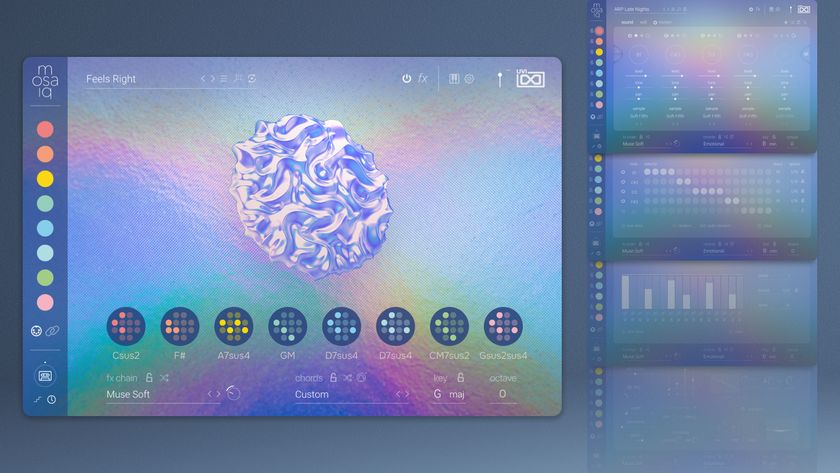
Discover new rhythms, patterns and sound palettes with UVI’s multi-faceted Mosaiq
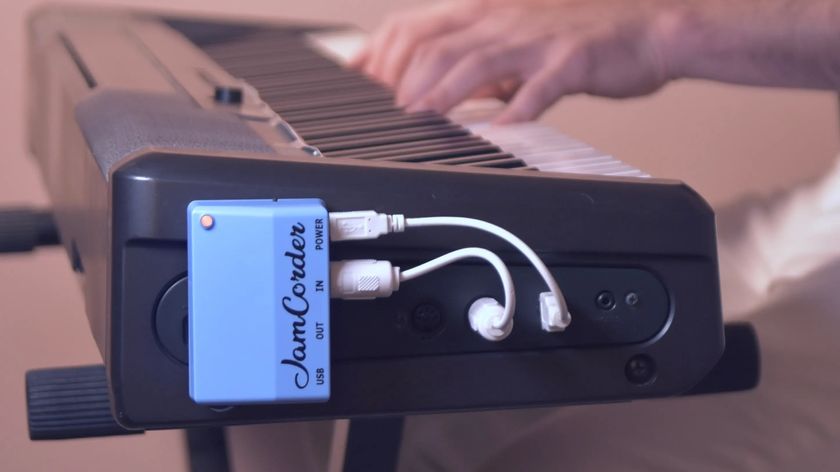
"Have you ever been playing something awesome and thought 'I should have recorded that?' Now, you did!": Jamcorder automatically records everything you play on piano - so you'll never lose a spontaneous jam again

